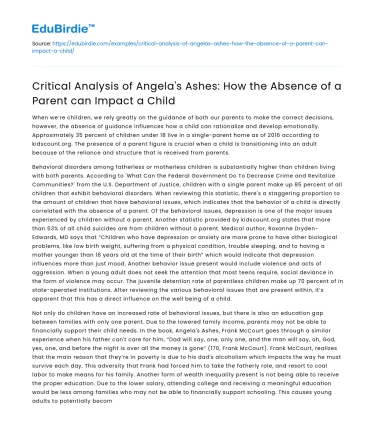When we’re children, we rely greatly on the guidance of both our parents to make the correct decisions, however, the absence of guidance influences how a child can rationalize and develop emotionally. Approximately 35 percent of children under 18 live in a single-parent home as of 2016 according to kidscount.org. The presence of a parent figure is crucial when a child is transitioning into an adult because of the reliance and structure that is received from parents.
Behavioral disorders among fatherless or motherless children is substantially higher than children living with both parents. According to 'What Can the Federal Government Do To Decrease Crime and Revitalize Communities?' from the U.S. Department of Justice, children with a single parent make up 85 percent of all children that exhibit behavioral disorders. When reviewing this statistic, there's a staggering proportion to the amount of children that have behavioral issues, which indicates that the behavior of a child is directly correlated with the absence of a parent. Of the behavioral issues, depression is one of the major issues experienced by children without a parent. Another statistic provided by kidscount.org states that more than 63% of all child suicides are from children without a parent. Medical author, Roxanne Dryden-Edwards, MD says that “Children who have depression or anxiety are more prone to have other biological problems, like low birth weight, suffering from a physical condition, trouble sleeping, and to having a mother younger than 18 years old at the time of their birth” which would indicate that depression influences more than just mood. Another behavior issue present would include violence and acts of aggression. When a young adult does not seek the attention that most teens require, social deviance in the form of violence may occur. The juvenile detention rate of parentless children make up 70 percent of in state-operated institutions. After reviewing the various behavioral issues that are present within, it’s apparent that this has a direct influence on the well being of a child.
Not only do children have an increased rate of behavioral issues, but there is also an education gap between families with only one parent. Due to the lowered family income, parents may not be able to financially support their child needs. In the book, Angela's Ashes, Frank McCourt goes through a similar experience when his father can't care for him, “Dad will say, one, only one, and the man will say, oh, God, yes, one, and before the night is over all the money is gone” (170, Frank McCourt). Frank McCourt, realizes that the main reason that they’re in poverty is due to his dad's alcoholism which impacts the way he must survive each day. This adversity that Frank had forced him to take the fatherly role, and resort to coal labor to make means for his family. Another form of wealth inequality present is not being able to receive the proper education. Due to the lower salary, attending college and receiving a meaningful education would be less among families who may not be able to financially support schooling. This causes young adults to potentially become lost and over stressed, especially considering the price of college nowadays. Young adults who have spent time living in single-parent family completed nearly 1.32 fewer years of schooling than two-parent families, according to the academic journal “Education Next”. To add to this, the college completion rate also was 26 percentage points lower for 24-year-olds who lived in single-parent homes as teens. Both of these statistics show that teens/young adults may not get the start to life which restarts the wealth inequality cycle. Education is important because it has the potential to break a family out of poverty, therefore focusing on the education of a child should be a high priority in a poverty struck family.
While behavioral problems and wealth inequality are the most predominant negative influences of growing up in a single-parent family, it also impacts the general well-being of a child. When exposed to variables such as poverty, it can cause stress which may also lead to drug addiction. This escape from reality is the main reason why many turn to drugs to avoid the problems that they are faced with on a daily basis. Without both parents enforcing the rules, a teen may not value the guidance given to them at a young age. Another problem having a large role teens specifically is promiscuity and teen pregnancy. Similar to the deviance shown in drug use, a teen may also feel that the advice given to them is invalid or unmeaningful with sex. Single-parent teens are more likely to experience problems with sexual health, including a greater likelihood of having intercourse before the age of 16, according to Psychology Today. And as we know, sometimes teens don't have the correct rationality to make decisions that could change their lives. The well-being of the child should also be accounted for because they could potentially make harmful decisions that hurt their future.
When a child does not obtain the proper guidance from their parents, its apparent that multiple problems such as education inequality, behavioral issues, and general well-being can occur. This being said, the presence of a parent figure is crucial when a child is transitioning into an adult because of the reliance and structure that is received from parents. In conclusion, the guidance provided by a guardian is crucial to a child's well being.






 Stuck on your essay?
Stuck on your essay?

